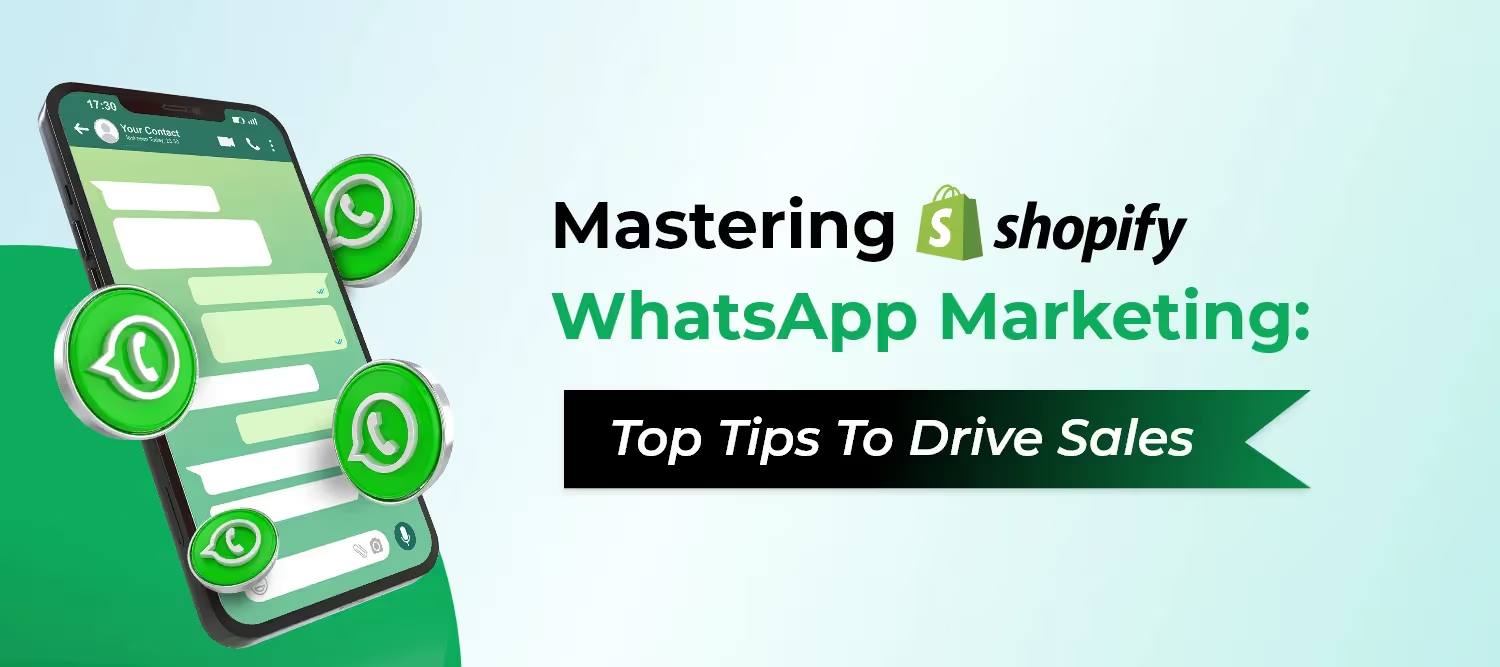
Employing WhatsApp marketing for your Shopify store can be a game-changing strategy to drive sales. As a personal communication tool, WhatsApp can bring many benefits to Shopify online sellers.
With WhatsApp, you can provide instant support, answer inquiries and address concerns in real time. It offers a direct and intimate channel to connect with customers. So you can foster authentic relationships and enhance the overall shopping experience.
As WhatsApp offers customer-centric experiences, leveraging the app to improve customer shopping experience is necessary. Here are some ways to master the art of WhatsApp marketing for Shopify sellers.
First and foremost, you must understand the initial steps for using WhatsApp for Shopify. We've listed eight practical steps for leveraging this popular app. Let's delve into the details.
If you haven't already, create a WhatsApp Business account for your business. You'll get access to additional features specifically designed for businesses, such as automated messages, labels, and statistics.
.avif)
Shopify offers various plugins and apps that allow you to integrate WhatsApp chat functionality directly into your store. Search for a WhatsApp chat plugin in the Shopify App Store, then install the one that best fits your needs.
Once installed, customize the WhatsApp chat plugin to match your brand's aesthetics and messaging style. You can customize the color, position, and behavior of the chat widget to integrate it into your store seamlessly. Trust us, this won't be a difficult task, but a fun one!
Next, use WhatsApp's automated messaging features to set up predefined responses for responding to greetings and frequently asked questions. This will help you provide quick and efficient customer support even when you cannot respond immediately.
Promote your WhatsApp number on your Shopify store and other marketing channels such as social media, email newsletters, and advertisements. Encourage customers to reach out via WhatsApp for support and inquiries or to receive updates and promotions.
Actively engage with customers who reach out to you via WhatsApp. Provide timely responses and personalized assistance to nurture relationships, offer product recommendations, and provide valuable information.
As you use WhatsApp to serve Shopify customers, don't forget to monitor your WhatsApp marketing performance. You can track metrics such as message response times, engagement, and conversion rates using WhatsApp Business Analytics or the plugin installed on your Shopify.
.avif)
After setting up your WhatsApp business for Shopify, here comes the real deal. We've listed seven strategies to help you optimize your WhatsApp marketing efforts to drive higher sales and customer satisfaction.
Personalized messaging involves tailoring your communication to individual customers. If you want to go the extra mile, we recommend you reach out to customers manually. You'll be able to greet them by their names and give natural responses.
However, this strategy may take more time. If you don't find this effective, leverage automation features on WhatsApp business to offer personalized recommendations on products and other offerings.
For instance, if a customer has bought dresses from your store, you can send them a message showcasing new arrivals in dresses that match their style preferences. You can easily encourage them to reply to your message.
.avif)
Offering exclusive deals, discounts, and promotions to your WhatsApp subscribers can incentivize purchases. For long-term benefits, this strategy can foster a sense of loyalty among your customers and potential buyers.
Consider offering a WhatsApp message to your subscribers during the sale period. This exclusive offer incentivizes customers to shop during the limited time frame.
Providing special offers that are only available through WhatsApp creates exclusivity and urgency. In return, it creates excitement and encourages customers to take action and make an immediate purchase.
Use WhatsApp to send product catalogs and updates, showcasing your latest products, collections, and promotions directly to their mobile devices. Make sure your catalogs are visually appealing with compelling copywriting.
We recommend you create infographics or posters to showcase your new products. However, you can also send high-quality images with tailored messaging to encourage customers to engage with your content.
Short animated videos are also preferable to demonstrate use cases or explain features. Provide a link to your Shopify store so that customers can take a look at your new product immediately without any hassle.
.png)
WhatsApp is an excellent app that provides instant customer support. It allows customers and potential buyers to contact you with questions, concerns, or feedback in real-time and get immediate responses.
Giving quick answers and solutions enhances the overall customer experience and builds loyalty with your audience. This can be why customers choose your store over competitors and buy your products immediately.
.avif)
It's common for Shopify users to leave some products in their shopping carts. When this happens frequently in your store, it's time for abandoned cart recovery. This strategy needs you to reengage potential customers.
By reminding them of their pending purchase and offering assistance or incentives to complete the transaction, you try to recover lost sales and potentially increase your conversion rate.
You can set up automated WhatsApp messages to remind potential buyers about the items in their carts. Encourage them to complete their purchase. Additionally, you can offer a limited-time discount or free shipping to incentivize them to finalize the transaction.
You can also use WhatsApp for sharing customer experiences, such as feedback and reviews. Positive reviews and testimonials are social proof to build credibility and trust in your brand. You also reassure potential customers about the quality and reliability of your products.
You can share this review with your WhatsApp subscribers, along with a message thanking the customer for their feedback and inviting others to try the product themselves. Additionally, you can encourage customers to leave reviews by offering incentives.
Don't forget to keep monitoring your WhatsApp performance. Track crucial metrics and keep refining your efforts continuously. Consider gathering customer feedback and experimenting with different approaches to identify areas for improvement.
For instance, you notice that certain promotional messages receive higher engagement rates than others on WhatsApp. You can use this insight to refine your messaging strategy and tailor future promotions.
Additionally, you can A/B test different messaging variations to determine which ones perform best. This way, you can optimize your approach accordingly.
Indeed, mastering Shopify WhatsApp Marketing offers a dynamic avenue for driving sales and fostering meaningful connections with your audience. The seven top tips can help you leverage the power of personalized messaging to grow your Shopify business.
WhatsApp is a great tool for creating memorable experiences for your customers while cultivating loyalty in the competitive e-commerce landscape. Keep refining your strategies with the latest customer trends to stay competitive and relevant with your target market.

Andre Oentoro is the founder of Breadnbeyond, an award-winning explainer video company. He helps businesses increase conversion rates, close more sales, and get positive ROI from explainer videos (in that order).